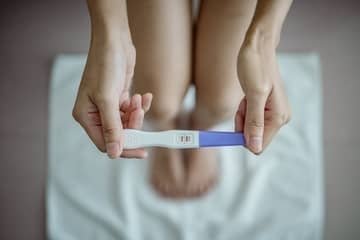
What are the most common signs of miscarriage?
Miscarriage is a nightmare especially in the first trimester, because in the first 12 weeks of pregnancy it affects 20 to 25 percent of women. 80% of abortions occur in the 1st trimester. The risk of unwanted termination of pregnancy by natural expulsion of the fetus decreases after 13 to 20 weeks. The reasons for spontaneous abortion are various influenceable and non-influenceable factors. You can completely eliminate the influencers, which will significantly reduce the risk of miscarriage. You can completely eliminate alcohol consumption, drug use, and smoking, and you can avoid staying up late and stress. You can also influence your weight, which can affect the completeness of the pregnancy. The reason for the abortion can also be various health problems or older age. For example infection (septic abortion - infection of the uterus), concomitant diseases (heart problems, diabetes, high blood pressure, endocrine gland disorders), placental defects, genetic or chromosomal defects of the fetus, problems with the cervix, etc.
The symptoms of a spontaneous abortion are strikingly reminiscent of a heavier period, so a woman often finds out about the pregnancy only after the abortion. Symptoms can vary depending on the stage of pregnancy a woman is in. The most common symptom is heavy bleeding and spotting. It is often accompanied by a discharge of tissue from the vagina that resembles a blood clot. The discharge is relatively intense and lumpy. In the first trimester, a miscarriage can also be indicated by increasing abdominal pain and strong cramps. Spasmodic pains in the lower abdomen reminiscent of intense menstrual cramps or contractions usually shoot into the back. Some women felt only mild pain, while others described it as strong and unrelenting. The duration of bleeding and pain is individual during spontaneous abortion, but should not exceed 7 days. If the bleeding lasts longer, it is necessary to see a doctor immediately.
It can be difficult to tell the difference between a miscarriage and a period, but with a miscarriage, larger blood clots are released, the pain that shoots into the abdomen or back gets worse, and the symptoms last longer than with a period. Bleeding (self-cleaning after abortion) can even last up to several weeks. Another signal that something is wrong in the body is if there is non-menstrual bleeding during the cycle.
Spontaneous abortion can occur at any stage of the menstrual cycle, not only during planned menstrual bleeding. A complete abortion usually occurs, in which the fetus is expelled from the body completely, but an incomplete abortion can also occur. The latter is also accompanied by bleeding, cramps and the opening of the cervix, but the remains of the amniotic sac or placenta remain in the uterus after the abortion. The rest of the fetus must be removed by curettage. This is a necessity even in the case of concealed abortion. With him, the woman does not notice that she has had a miscarriage, the doctor only discovers it during the ultrasound. In addition to complete and incomplete abortion, there is also threatened abortion. Symptoms will appear, but if they can be stopped in time, the fetus has a chance of survival. The chance of rescue is up to 50%.
It is very important for a woman to be able to cope with an abortion. Women who have experience with spontaneous abortion advise to talk about the problem at least with their partner. Some recommend finding the cause (bad spermiogram of the partner, problems with the thyroid gland, uterus, etc.) so that you can try for a baby again. However, coming to terms with abortion is very individual, feelings of sadness, disappointment, anger or helplessness are justified. Every woman copes with difficult situations in her own way, often it just takes time. According to the discussants and doctors, you can start trying for another pregnancy in 3 to 6 months at the earliest.
Pridať komentár







